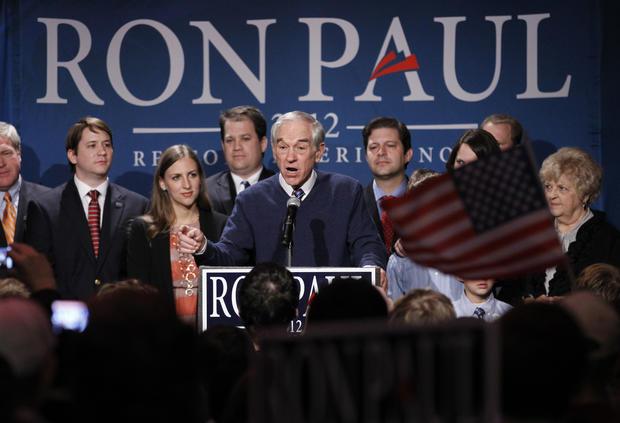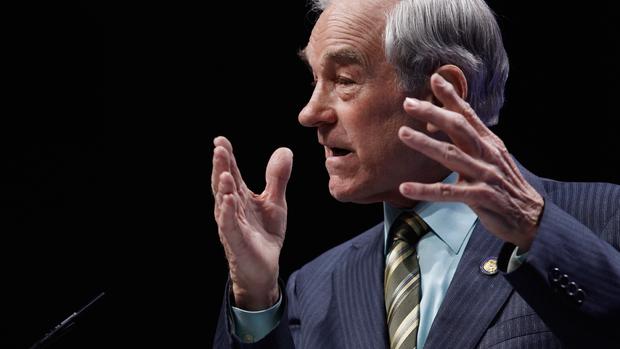Ron Paul gears up for the long haul
NORTH CHARLESTON, S.C. -- In South Carolina's primary contest on Saturday, Ron Paul walked away with fourth place, earning only 13 percent of voter support -- a far cry from winner Newt Gingrich's commanding 40 percent finish.
But don't mistake a last-place finish for a signal that the outspoken Libertarian has any plans to pack it up anytime soon.
"There's no doubt in my mind the momentum has been continuing and will continue," an exuberant Paul said in his remarks following the primary. "This is the beginning of a long, hard climb."
"We will continue to do this," the Texas lawmaker pledged. "There is no doubt about it. The message of liberty is being received more people every single day, thanks to your efforts."
Full South Carolina primary resultsSouth Carolina exit poll
GOP delegate scorecard
Complete primary and caucus results
His advisers have even been touting a Gingrich victory as a win for Paul.
"The fact that Newt Gingrich could challenge Mitt Romney shows us it's a wide-open race," said Paul adviser Doug Wead in an interview with MSNBC before the race was called. "There's still going to be money pumped into both of those campaigns -- that's very good for us."
Unlike many presidential campaigns - including most if not all of his current rivals for the Republican nomination - the Paul team's strategy eschews the power of popular momentum, counting instead on a long-term mathematical calculation grounded in picking up delegates in nominating contests across the country.
As of now, there are 2,286 total delegates in the Republican primary process. A candidate needs to win 1,144 delegates to earn the nomination, and states award delegates three ways: a winner-takes-all system, in which the primary winner snaps up all of the state's delegates; a proportional allocation, in which a candidate gets delegates proportionately to the percentage he or she won in the primary at hand; and a non-binding system, where no delegates are awarded on primary night but rather allocated by delegates down the road.
Paul says his strategy is to determine where he has the best opportunities to pick up delegates (generally in states with proportional representation and caucuses) and selectively invest his resources. Even in the near-certainty that he doesn't get enough delegates to secure the nomination, it's possible he could get enough to prevent someone else from doing so -- giving him, and his message, a chance to exert real influence at the Republican convention this summer.
In other words, Paul says he's in this thing until the bitter end.
"We will be going to the caucus... states and we will be promoting the whole idea of getting more delegates, because that's the name of the game," Paul told supporters Saturday.
"I have been in this business of promoting this cause in the electoral process for a long time. At the beginning, I thought it was just going to be promotion of a cause. Then it dawned on me, if you win elections and win delegates, that's the way you promote a cause," he added.
The strategy, of course, only works if a candidate is able to get voters to turn out to vote even barring significant national momentum. That's where Paul's unique political status gives him an advantage: the longtime Texas lawmaker has a fervent, committed base of supporters. They turn out in high numbers, they donate money, and often, they say they'll vote for Paul or no one at all.
According to Paul's campaign, the candidate is already looking ahead to several contests in February where they think he has a shot of picking up delegates. Effectively skipping Florida, which has an all-or-nothing allocation system, he'll instead try to get a head start in states more favorable to his electoral interests.
"We've got four early-caucus states coming up next month. Colorado, which is a caucus-convention hybrid, Minnesota, Maine, and of course Nevada," said Paul's campaign chairman, Jesse Benton. "We've had field operations there with multiple employees, IDing voters, doing voter outreach, knocking on doors, working the phones and building coalitions, and we plan to compete and win in those caucuses."
Another element that could enable Paul to execute this strategy is the organized nature of his campaign's operation. Like Romney, the candidate has the internal structure and funding necessary to carry out campaigns on the ground in several states at a time. Benton said Thursday the campaign has about $2 million in cash on hand, and "we raise $100,000 a day." The campaign is already airing ads in Nevada and Minnesota.
"There are two campaigns with real downstream organizations in the delegate-rich states moving to Super Tuesday and beyond -- and that's Ron Paul and Mitt Romney," Benton said, referring to March 6, when ten states hold elections.
Where does Mitt Romney go from here?How Newt Gingrich won the South Carolina primary
What do South Carolina voters want?
Few people think Paul will end up with the nomination, but some Republicans worry that a long fight for it could hurt the party's chances in the general election against President Obama.
Benton was quick to dismiss the notion that Paul's continued candidacy would prove damaging to the GOP. He also emphasized that the candidate was not considering running under a third-party candidacy barring "some sort of financially catastrophic event in this country."
Conversely, Paul's supporters say, his staying in the race will give voice to what they perceive as a marginalized political view that deserves more attention from the Republican establishment.
"It'll make us better," Benton said. "By making people compete; by getting people engaged in the process, getting involved in the party; bringing new people into the party - young people, independents, people that were disaffected before; getting them involved showing them that they can have a voice."
The open question is exactly how many people will engage -- and whether it will be enough to bring Paul the leverage he wants.
Regardless, South Carolina is one state where the candidate's appeal to young people is palpable. At an event in North Charleston Friday morning, the modest crowd was heavy with young, fervent supporters. Even at Stephen Colbert's farcical rally with Herman Cain, which was held on the campus of the College of Charleston the same day, Paul fans abounded.
Kelsey Sears, Sarah Proctor and Toogie Clyburn, three sophomore women who attend the college, had recently seen the candidate at an on-campus appearance.
"He's super big on freedom of every single aspect, and that really struck me," said Sears.
"I know this is so stupid, but he's so cute!" giggled Proctor, while her friends, laughing, affirmed her assessment.
Twenty-year-old Miles Young, meanwhile, who lives in Charleston but doesn't go to the college, said Paul was the only candidate he trusted.
"Any situation where the government's telling me what to do is a bad situation," said Young, a slim, tattooed young man wearing a green watchcap.
Young, many of Paul's fans at that morning's rally said that if Paul wasn't on the ballot next November he wouldn't vote at all.
"There's no one worth voting for," he said.


